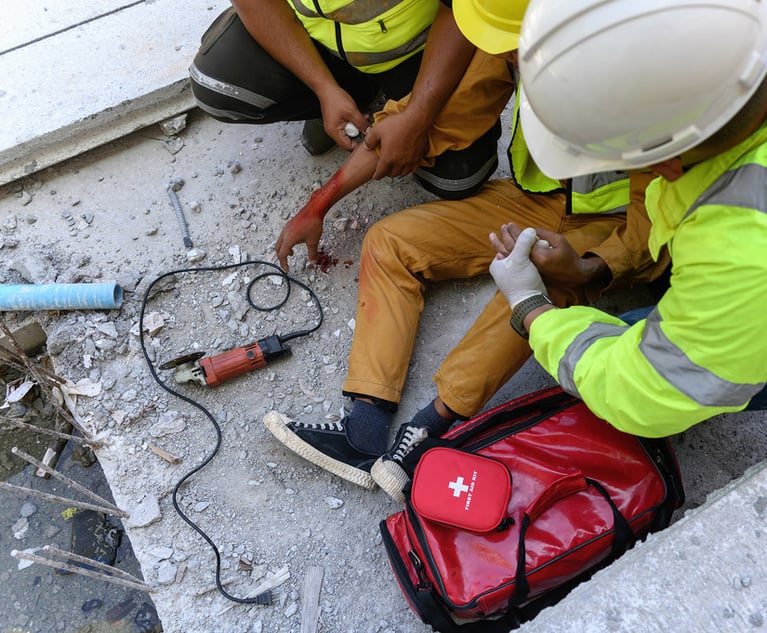NJ Courts Must Not Limp Into the Electronic Age
The U.S. Supreme Court announced on Aug. 3, 2017, that the court will begin electronic filing on Nov. 13, an odd date, given that the term begins…
October 20, 2017 at 04:22 PM
6 minute read

The U.S. Supreme Court announced on Aug. 3, 2017, that the court will begin electronic filing on Nov. 13, an odd date, given that the term begins the first Monday in October (as we all know), but a step into the modern era that we all can applaud. Not only will counsel be able to file and serve their briefs electronically, but the public will be able to access documents through the portal—at least documents filed after the start date—without cost. The court developed the system in-house, so it is not connected to the federal PACER system used for other federal court filings.
The federal electronic filing systems thus can be contrasted, top to bottom, with the New Jersey filing systems. The Appellate Division has had electronic filing for about four years, and the Civil Division is gradually rolling out its system on a mandatory basis, vicinage by vicinage. By anecdotal accounts, the systems are working well, and, except for its drop-dead deadlines—by which materials filed incorrectly are not accepted nunc pro tunc once the corrections are made—have been well received.
The state system has two significant shortcomings, though.
First, the existing filing systems do not allow fully functional public or other non-party access to the systems for checking dockets off-site and downloading filings. Although a new Electronic Access Program may permit a registered person to conduct a docket search, the actual brief or other filing is not visible/readable. Even registered users may not copy or “scrape” documents from the system. To obtain a copy of an Appellate Division brief, a non-party still must order it or make an appointment and then travel to the Hughes Justice Complex in Trenton to review and order copies of any documents. (Attorneys for parties can access filings in their case for downloading and printing from the Judiciary website.) Civil Division documents are available only in county courthouses and, in some counties, only on specified days after making a written request. The off-site public docket system (ACMS) remains obscure and riddled with shorthand codes that must be translated using a memo hidden on the court's web site. Nearby states, such as New York, are far ahead of New Jersey on these fronts.
Second, the New Jersey Supreme Court does not have an electronic filing system for civil cases. The backbone of a system apparently exists, such that the Public Defender, Attorney General and other state offices for which filing fees are waived can access the system. But the court's inability (so far) to organize a credit card or court account link for paying filing fees has stymied broader access. This contrasts to the court's generally progressive attitude toward technology, such as making oral arguments available on the web page.
We welcome the steps into the electronic age taken by the federal and state systems. We understand that budgeting issues have delayed the electronic filing systems in New Jersey, but the technical issues should be overcome. After all, the federal PACER system and other states have solved those problems decades ago. We hope that the judiciary will move forward with an aggressive timetable to resolve them.

The U.S. Supreme Court announced on Aug. 3, 2017, that the court will begin electronic filing on Nov. 13, an odd date, given that the term begins the first Monday in October (as we all know), but a step into the modern era that we all can applaud. Not only will counsel be able to file and serve their briefs electronically, but the public will be able to access documents through the portal—at least documents filed after the start date—without cost. The court developed the system in-house, so it is not connected to the federal PACER system used for other federal court filings.
The federal electronic filing systems thus can be contrasted, top to bottom, with the New Jersey filing systems. The Appellate Division has had electronic filing for about four years, and the Civil Division is gradually rolling out its system on a mandatory basis, vicinage by vicinage. By anecdotal accounts, the systems are working well, and, except for its drop-dead deadlines—by which materials filed incorrectly are not accepted nunc pro tunc once the corrections are made—have been well received.
The state system has two significant shortcomings, though.
First, the existing filing systems do not allow fully functional public or other non-party access to the systems for checking dockets off-site and downloading filings. Although a new Electronic Access Program may permit a registered person to conduct a docket search, the actual brief or other filing is not visible/readable. Even registered users may not copy or “scrape” documents from the system. To obtain a copy of an Appellate Division brief, a non-party still must order it or make an appointment and then travel to the Hughes Justice Complex in Trenton to review and order copies of any documents. (Attorneys for parties can access filings in their case for downloading and printing from the Judiciary website.) Civil Division documents are available only in county courthouses and, in some counties, only on specified days after making a written request. The off-site public docket system (ACMS) remains obscure and riddled with shorthand codes that must be translated using a memo hidden on the court's web site. Nearby states, such as
Second, the New Jersey Supreme Court does not have an electronic filing system for civil cases. The backbone of a system apparently exists, such that the Public Defender, Attorney General and other state offices for which filing fees are waived can access the system. But the court's inability (so far) to organize a credit card or court account link for paying filing fees has stymied broader access. This contrasts to the court's generally progressive attitude toward technology, such as making oral arguments available on the web page.
We welcome the steps into the electronic age taken by the federal and state systems. We understand that budgeting issues have delayed the electronic filing systems in New Jersey, but the technical issues should be overcome. After all, the federal PACER system and other states have solved those problems decades ago. We hope that the judiciary will move forward with an aggressive timetable to resolve them.
This content has been archived. It is available through our partners, LexisNexis® and Bloomberg Law.
To view this content, please continue to their sites.
Not a Lexis Subscriber?
Subscribe Now
Not a Bloomberg Law Subscriber?
Subscribe Now
NOT FOR REPRINT
© 2025 ALM Global, LLC, All Rights Reserved. Request academic re-use from www.copyright.com. All other uses, submit a request to [email protected]. For more information visit Asset & Logo Licensing.
You Might Like
View All
ABC's $16M Settlement With Trump Sets Bad Precedent in Uncertain Times
8 minute read

Neighboring States Have Either Passed or Proposed Climate Superfund Laws—Is Pennsylvania Next?
7 minute read
Trending Stories
- 1The Law Firm Disrupted: Scrutinizing the Elephant More Than the Mouse
- 2Inherent Diminished Value Damages Unavailable to 3rd-Party Claimants, Court Says
- 3Pa. Defense Firm Sued by Client Over Ex-Eagles Player's $43.5M Med Mal Win
- 4Losses Mount at Morris Manning, but Departing Ex-Chair Stays Bullish About His Old Firm's Future
- 5Zoom Faces Intellectual Property Suit Over AI-Based Augmented Video Conferencing
Who Got The Work
J. Brugh Lower of Gibbons has entered an appearance for industrial equipment supplier Devco Corporation in a pending trademark infringement lawsuit. The suit, accusing the defendant of selling knock-off Graco products, was filed Dec. 18 in New Jersey District Court by Rivkin Radler on behalf of Graco Inc. and Graco Minnesota. The case, assigned to U.S. District Judge Zahid N. Quraishi, is 3:24-cv-11294, Graco Inc. et al v. Devco Corporation.
Who Got The Work
Rebecca Maller-Stein and Kent A. Yalowitz of Arnold & Porter Kaye Scholer have entered their appearances for Hanaco Venture Capital and its executives, Lior Prosor and David Frankel, in a pending securities lawsuit. The action, filed on Dec. 24 in New York Southern District Court by Zell, Aron & Co. on behalf of Goldeneye Advisors, accuses the defendants of negligently and fraudulently managing the plaintiff's $1 million investment. The case, assigned to U.S. District Judge Vernon S. Broderick, is 1:24-cv-09918, Goldeneye Advisors, LLC v. Hanaco Venture Capital, Ltd. et al.
Who Got The Work
Attorneys from A&O Shearman has stepped in as defense counsel for Toronto-Dominion Bank and other defendants in a pending securities class action. The suit, filed Dec. 11 in New York Southern District Court by Bleichmar Fonti & Auld, accuses the defendants of concealing the bank's 'pervasive' deficiencies in regards to its compliance with the Bank Secrecy Act and the quality of its anti-money laundering controls. The case, assigned to U.S. District Judge Arun Subramanian, is 1:24-cv-09445, Gonzalez v. The Toronto-Dominion Bank et al.
Who Got The Work
Crown Castle International, a Pennsylvania company providing shared communications infrastructure, has turned to Luke D. Wolf of Gordon Rees Scully Mansukhani to fend off a pending breach-of-contract lawsuit. The court action, filed Nov. 25 in Michigan Eastern District Court by Hooper Hathaway PC on behalf of The Town Residences LLC, accuses Crown Castle of failing to transfer approximately $30,000 in utility payments from T-Mobile in breach of a roof-top lease and assignment agreement. The case, assigned to U.S. District Judge Susan K. Declercq, is 2:24-cv-13131, The Town Residences LLC v. T-Mobile US, Inc. et al.
Who Got The Work
Wilfred P. Coronato and Daniel M. Schwartz of McCarter & English have stepped in as defense counsel to Electrolux Home Products Inc. in a pending product liability lawsuit. The court action, filed Nov. 26 in New York Eastern District Court by Poulos Lopiccolo PC and Nagel Rice LLP on behalf of David Stern, alleges that the defendant's refrigerators’ drawers and shelving repeatedly break and fall apart within months after purchase. The case, assigned to U.S. District Judge Joan M. Azrack, is 2:24-cv-08204, Stern v. Electrolux Home Products, Inc.
Featured Firms
Law Offices of Gary Martin Hays & Associates, P.C.
(470) 294-1674
Law Offices of Mark E. Salomone
(857) 444-6468
Smith & Hassler
(713) 739-1250






